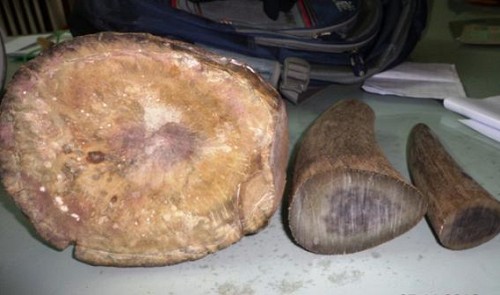Vietnam keeps a large quantity of the wildlife products seized from trafficking rings so competent agencies are questioning if they should destroy such products, given their high material value.
>> Over 13kg smuggled rhino horns seized at HCMC airport >> Campaign to save endangered rhinos launched in Hanoi >> Smugglers of 2.4 tons of elephant tusks sentenced
According to the Wildlife Conservation Society (WCS), Vietnamese authorities now have a total of 27 tons of elephant tusks and hundreds of kilograms of rhino horn which were confiscated from wildlife traffickers. In response to this information, Assoc. Prof. Dr Pham Van Luc, chairman of the Scientific Council of the Vietnam National Museum of Nature, said the museum is currently keeping large quantities of ivory tusks, rhino horns, tortoise scales, and many animal parts of precious and rare species. Of these items, only a small quantity is on display, while the rest are carefully preserved in warehouses, Dr. Luc said. As a rule, concerned agencies must destroy such products to emphasize their disapproval of wildlife trafficking. However, given that the total material value of these items is very high, local competent bodies are considering how to handle them properly, Dr. Luc said. The council has come up with the idea that such items could be processed to make souvenirs, but such an act would violate international conventions as well as Vietnamese regulations pertaining to the conservation and protection of wildlife, Dr. Luc added. Regarding this matter, on March 24, the Ministry of Agriculture and Rural Development suggested that ivory tusks, rhino horns, and tiger bones should be destroyed in accordance with Vietnam’s ban on the trade in wildlife. “We hope a meeting will be held so that concerned agencies can discuss the issue and reach a final decision on how to handle the seized items,” he said, following the ministry’s suggestion. Meanwhile, Prof. Dr. Dang Huy Huynh, chairman of the Vietnam Animal Association, said he has a special interest in whether ivory tusks and rhino horns should be destroyed or stored. The destruction of such wildlife would be a waste because it is worth a lot of money, which could be used to promote the conservation of wildlife, said Dr. Huynh. “But it is our association’s view to support the Ministry of Agriculture and Rural Development’s suggestion to destroy illegal goods,” Dr. Huynh added. Last month, Prime Minister Nguyen Tan Dung issued a directive, ordering a fierce combat against trafficking in rare and endangered animals or their parts to recover the country's poor reputation regarding the protection of its wildlife. The directive was made following the recent discovery of trafficking in endangered and rare wild animals in Vietnam, including rhino horn, African elephant tusks, and tigers. The premier asked concerned agencies to conduct more patrols and inspections in border areas, international airports, and ports to help detect and prevent wildlife trafficking.





















































